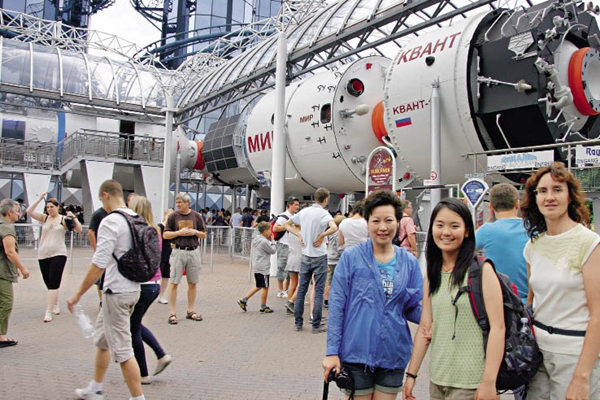'China was the best experience of my life'
- By Helmut Matt
 0 Comment(s)
0 Comment(s) Print
Print E-mail China Today, November 25, 2016
E-mail China Today, November 25, 2016
A Year of German-Chinese School and Youth Exchange
Freiburg Main Station! Above me was the clear autumn morning sky. Full of thoughts, yet filled with joyful anticipation, I waited at platform No. 2. What changes would the upcoming 10 months bring to our lives? Would we get along well with our 15-year-old guest "daughter" from China?
In fact, we already knew each other, having spent a thoroughly enjoyable couple of days on Huangshan Mountain with her and her mother a few months earlier. But how would it be living under one roof for almost one year?
When the doors of the long-distance train opened, Yiqi was one of the first passengers to alight, and all my worries evaporated. A delighted smile on her face, Yiqi ran in my direction and greeted me as if I was her own father. I now had no doubt that this coming year would be full of beautiful, interesting and exciting experiences, for my family as well as for our guest-daughter from Anhui Province in southern China.
 |
|
Chinese exchange student, Yiqi, visits the Europa-Park in Rust, Germany, with her mother and host mother. |
I took Yiqi's luggage and we walked to my car. I knew that my wife Linda would be impatiently waiting at home for us to arrive.
We had come up with a very special idea for the first day. It was on that Sunday that the German town of St. Morgen in the Black Forest region would hold its traditional horse festival Rossfest. Enthralled, Yiqi stood among the other visitors listening to festive folk music, gazing at the parade with its numerous historical horse-drawn carriages and at the villagers attired in traditional Black Forest costumes. My wife and I agreed that there couldn't have been a better start to an exchange year in Germany.
Going abroad to China?
What some years ago might have sounded outlandish seems quite normal nowadays: There are associations, schools, universities, and other organizations throughout both Germany and China that engage in exchanges between the two countries.
However, it has been a long road since 1972, when diplomatic relations were established between the Federal Republic of Germany and the People's Republic of China, and the first direct contact between the pupils and university students of both countries. It was nevertheless one full of positive experiences, mutual learning, and growing trust between the two countries.
Today, China is Germany's most important economic partner in Asia, while Germany, in turn, is China's most important trade partner in Europe. Friendly and dynamic is how the present relationship between China and Germany could most precisely be described, in my opinion.
Regular bilateral high-level coordination between the governments of the two countries, steadily growing trade relations, and mutual investments and cooperation in fields like science, research and environmental matters all signify greater and closer links between Germany and China.
Since Chinese President Xi Jinping's state visit to Germany in March 2014, China and Germany have defined their relationship as a "Strategic Partnership in global responsibility," and indeed spoken of it as a "comprehensive strategic partnership." Both sides have held regular, high-level government consultations since 2011.
Exchanges between different cultures and peoples from Germany and China are just as important as diplomatic and economic contacts. Human encounters promote better mutual understanding, and help to reduce prejudice.
One key to better mutual understanding is that of mastering one another's languages. For years the Chinese government has tried to disseminate the Chinese culture and promote Chinese language learning overseas. These efforts have contributed substantively to a deepened understanding between the peoples of both nations.
Confucius Institutes, seen in many German cities today, play an especially important role in this regard. On the other side of the coin, the German Goethe Institute and Academic Exchange Service (DAAD), and a number of language centers do much to promote German language-learning in China.
Other important associations besides the Goethe Institutes include the German Academic Exchange Service, the Mercator Foundation, as well as "Youth for Understanding (YFU)." Nowadays, there are also many direct exchange programs between befriended schools and universities, for example the friendship between the Max-Weber-School Freiburg and its partner school in Tianjin, to name just one.
There are encounters at both the private and personal level, and cultural exchanges are gathering growing momentum. For instance, many excellent German orchestras, opera companies and ballet ensembles have come to China in recent years, as, in turn, more Chinese artists and performance troupes have traveled to and toured Germany.
During his visit to China in March 2016, German Federal President Joachim Gauck observed that, "Through direct contact with another culture, as well as the flow of ideas, the curiosity to understand the unknown or to see the familiar with new eyes grows, and from these positive mutual experiences grow trust and friendship."
During his state visit, Gauck together with Chinese President Xi Jinping, officially announced the start of the "German-Chinese Year of School and Youth Exchange," upon which both sides agreed in summer 2015. There is a common Chinese expression which means "to treat someone with full honesty." President Xi Jinping expressed in his speech in March 2014 his hope that the youth of Germany and China would get to know each other through mutual honesty.






Go to Forum >>0 Comment(s)